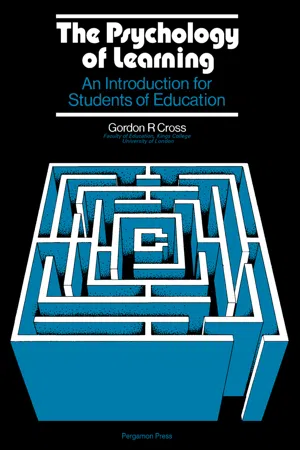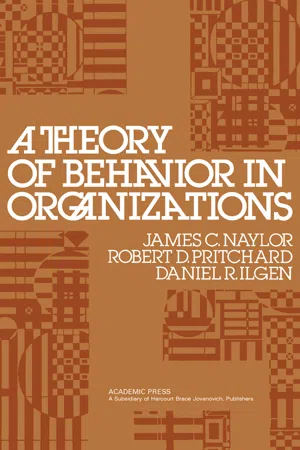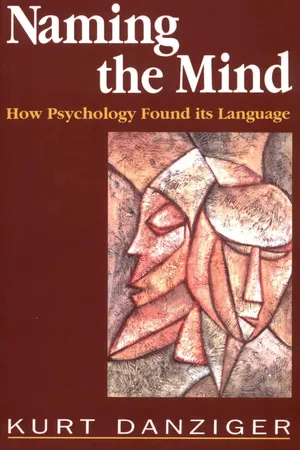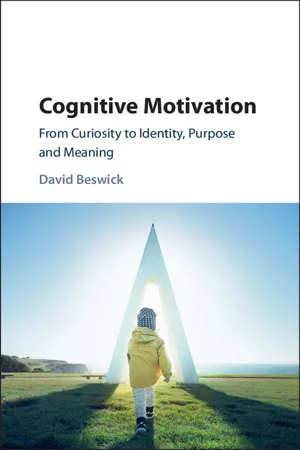Psychology
Specific Motivation
Specific motivation refers to the drive or desire to achieve a particular goal or outcome. It is characterized by a clear and defined target, such as a specific task, reward, or accomplishment. This type of motivation is often linked to individual preferences, values, and personal aspirations, and can be a powerful force in driving behavior and decision-making.
Written by Perlego with AI-assistance
Related key terms
1 of 5
8 Key excerpts on "Specific Motivation"
- eBook - PDF
The Psychology of Learning
An Introduction for Students of Education
- Gordon R. Cross, Edmund King(Authors)
- 2016(Publication Date)
- Pergamon(Publisher)
CHAPTER 4 Motivation Concept of Motivation Some aspects of motivation have already been discussed directly or by implication in the study of learning theories ; this was inevitable as learning and motivation are inextricably linked, indeed many claim that motivation is the heart of the learning process. If learning is defined as a permanent change in behaviour as a result of experience, then motivation is the study of the activation or arousal of behaviour, its strength and direction. The vocabulary of the subject is expansive and continues to grow at a pace faster than an acceptable understanding of its complex nature ; it is a splendid example of a polymorphous concept with a diversity of interpretation and classification. Adjectives like drive, need, goal, urge, impulse, set and incentive commonly occur in the language of psychology to describe basic motives. In the classroom the more readily observed surface motives are generally referred to as attitudes, interests, rewards, reproof, curiosity, status, anxiety to please and so forth. This immediately raises the problem as to whether it is necessary or worth while to attempt a classification of human motives ; for example, to differentiate between general and specific motives. Many behaviourists would argue that basic biological needs such as food for the survival of the organism or sex for the survival of the species are the mainsprings of activity. Need results from deprivation; whether it is a natural need as in the case offood by a hungry person, or an acquired need— for example, alcohol or drugs by an addict. The search for food or activity as a consequence of need is called drive. For the practical teacher the concept of need reduction and drive is too primitive and too distant from the everyday behaviour of children in the classroom where individual needs are subtle, complex and quite often completely hidden and disguised. An hierarchical structure of needs says 66 - eBook - PDF
Psychology
Made Simple
- Abraham P. Sperling, Kenneth Martin(Authors)
- 2013(Publication Date)
- Made Simple(Publisher)
14 MOTIVATION AND PERSONALITY Psychology is devoted to studying not only what people do, but why they do it. This 'why' of any human act is called the 'motive'. The psychologist's emphasis on motive as a means of understanding personality is not without basis. Experience has shown that it is not enough to observe an individual's behaviour in order to understand him. It is necessary to probe behind the actions themselves to find their origin or motive if we would understand the 'actor'. There is a popular expression which states that 'things are not always what they appear to be'. Nowhere is this more true than in the realm of human motivation. In elaborating this principle, psychologist Richard Husband reminds us that 'motivation is the crucial issue in deciding upon a penalty for killing a human being'. It is pointed out that in premeditated murder, the guilty one may, until comparatively recently, have been given a death sentence. If murder is committed in the heat of a brawl, the sentence is apt to be ten years' imprisonment. As we develop from infancy through childhood to adulthood, our behaviour becomes increasingly complex. Parallel with this develop-ment, that of our motivating forces also becomes vastly more compli-cated as we progress from infancy to adulthood. The most fundamental motives are those that stem from our body physiology and chemistry. Observe a hungry baby and you see a squirming, squealing human yelling for food. Leave a safety pin stuck in the baby's buttock and you are greeted with the same disturbed behaviour. It is the same when the infant is thirsty, fatigued, or calling for maternal affection. These body forces which activate infants as well as adults (but each in their own way) are referred to as 'drives'. Analysis shows that the body forces to which we refer are persistent internal stimuli which demand attention. - eBook - PDF
- James C. Naylor, Robert D. Pritchard, Daniel R. Ilgen(Authors)
- 2013(Publication Date)
- Academic Press(Publisher)
Motivation Motivation has received considerable conceptual treatment as a pro-cess fundamental to organizational psychology. There are a variety of theories of work modvation that have been proposed, and a considerable literature exists that has attempted to evaluate these theories empirically. This is appropriate if it is believed that understanding motivation is a necessary prerequisite to understanding behavior in organizations. We subscribe to the centrality of the motivation process, and have therefore attempted to develop this aspect of the theory rather fully. In this chapter, what we mean by motivation will be defined and gen-eral conceptual issues relating to it will be discussed. We shall then show how the theory deals with the motivation process. Finally, a point that has been raised in several previous chapters, namely, that people use simplifying strategies allowing them to deal with the complicated process of allocating their resources will be further developed. Defining Motivation Motivation has been defined in many ways, but as Campbell and Pritchard (1976) have pointed out, motivation generally deals in an op-erational sense with the amplitude and direction of behavior. That is, it deals with which behaviors are emitted (direction) and the vigor or inten-nty (amplitude) with which these behaviors are emitted. Our approach includes the amplitude and direction components but becomes more specific. For us, motivation is defined as the process of allocating personal re-sources in the farm of time and energy to vanous acts in such a way that the anticipated affect resulting from these acts is maximized, 159 6 160 A Theory of Behavior in Organizations This definition is very important, and we need to trace its components. T h e definition makes it clear that we are talking about acts. That is, motivation deals with the behaviors emitted by the person. - No longer available |Learn more
- (Author)
- 2014(Publication Date)
- College Publishing House(Publisher)
______________________________ WORLD TECHNOLOGIES ______________________________ Chapter 5 Motivation Theory Motivation is the driving force by which we achieve our goals. Motivation is said to be intrinsic or extrinsic. The term is generally used for humans but it can also be used to describe the causes for animal behavior as well. This refers to human motivation. According to various theories, motivation may be rooted in a basic need to minimize physical pain and maximize pleasure, or it may include specific needs such as eating and resting, or a desired object, goal, state of being, ideal, or it may be attributed to less-apparent reasons such as altruism, selfishness, morality, or avoiding mortality. Conceptually, motivation should not be confused with either volition or optimism. Motivation is related to, but distinct from, emotion. Motivation concepts Intrinsic and extrinsic motivation Intrinsic motivation refers to motivation that is driven by an interest or enjoyment in the task itself, and exists within the individual rather than relying on any external pressure. Intrinsic motivation has been studied by social and educational psychologists since the early 1970s. Research has found that it is usually associated with high educational achievement and enjoyment by students. Explanations of intrinsic motivation have been given in the context of Fritz Heider's attribution theory, Bandura's work on self-efficacy, and Deci and Ryan's cognitive evaluation theory. Students are likely to be intrinsically motivated if they: • attribute their educational results to internal factors that they can control (e.g. the amount of effort they put in), • believe they can be effective agents in reaching desired goals (i.e. the results are not determined by luck), • are interested in mastering a topic, rather than just rote-learning to achieve good grades. Extrinsic motivation comes from outside of the individual. - No longer available |Learn more
- (Author)
- 2014(Publication Date)
- The English Press(Publisher)
________________________ WORLD TECHNOLOGIES ________________________ Chapter-1 Motivation ________________________ WORLD TECHNOLOGIES ________________________ Motivation is the driving force which causes us to achieve goals. Motivation is said to be intrinsic or extrinsic. The term is generally used for humans but, theoretically, it can also be used to describe the causes for animal behavior as well. Here we, refer to human motivation. According to various theories, motivation may be rooted in the basic need to minimize physical pain and maximize pleasure, or it may include specific needs such as eating and resting, or a desired object, goal, state of being, ideal, or it may be attributed to less-apparent reasons such as altruism, selfishness, morality, or avoiding mortality. Conceptually, motivation should not be confused with either volition or optimism. Motivation is related to, but distinct from, emotion. Motivation concepts Intrinsic and extrinsic motivation Intrinsic motivation refers to motivation that is driven by an interest or enjoyment in the task itself, and exists within the individual rather than relying on any external pressure. Intrinsic motivation has been studied by social and educational psychologists since the early 1970s. Research has found that it is usually associated with high educational achievement and enjoyment by students. Explanations of intrinsic motivation have been given in the context of Fritz Heider's attribution theory, Bandura's work on self-efficacy, and Deci and Ryan's cognitive evaluation theory. Students are likely to be intrinsically motivated if they: • attribute their educational results to internal factors that they can control (e.g. the amount of effort they put in), • believe they can be effective agents in reaching desired goals (i.e. the results are not determined by luck), - eBook - ePub
Naming the Mind
How Psychology Found Its Language
- Kurt Danziger(Author)
- 1997(Publication Date)
- SAGE Publications Ltd(Publisher)
In industry, there were several problem areas for which the question of rewards and incentives was beginning to appear particularly relevant. More than the issue of productivity, which was traditionally handled rather mechanically, rising concern about extraordinarily high rates of labour turnover prompted calls for psychological input into questions of ‘unwillingness to work’ and work satisfaction (Frost, 1920). The steady centralization of hiring and firing decisions in large companies, and increasing faith in the wisdom of scientific experts, had also made the application of relevant psychological knowledge more feasible. Before World War I, psychological knowledge pertaining to rewards and incentives hardly existed; in the 1920s, however, research in this area blossomed. By 1927, the textbook presentation of the sub-discipline of applied psychology included chapters on ‘the measurement of character and interest’ and ‘satisfaction as a product of work’, as well as sections devoted to such topics as the ‘relative strength of desires’, ‘consumers’ likes and dislikes’, and ‘the conflict of motives’ (Poffenberger, 1927). In addition, there is a discussion of laboratory studies of punishment in the context of the treatment of criminal offenders.The more popular literature of ‘personal efficiency’, directed at ambitious and aspiring managers and salesmen, had been using the semantics of motivation and personality for some time. As early as 1917, about half of a book entitled The Executive and his Control of Men (Gowin, 1917) was devoted to what was called ‘motivating the group’. This included chapters on ‘rewards’ and on ‘personality’. The post-war literature on ‘influencing people’ popularized the notion that individuals could be readily manipulated by playing on their wants, interests and motives (Overstreet, 1925).Comparing the psychological and quasi-psychological literature of the second and third decades of the twentieth century with earlier usage, the change in the semantics of ‘motive’ is quite striking. Traditionally, a ‘motive’ was a substantive that referred to a specific aspect or entity linked to some human action. The verbal form, ‘to motivate’, and the abstract form, ‘motivation’, were quite rare and are not documented as having occurred before the late nineteenth century (Oxford English Dictionary - eBook - PDF
Cognitive Motivation
From Curiosity to Identity, Purpose and Meaning
- David Beswick(Author)
- 2017(Publication Date)
- Cambridge University Press(Publisher)
It is a process of arousal and satisfaction that energizes and directs behaviour in which rewards come from the experience of carrying out an activity rather than from results of the activity that are experienced subsequently. Behaviour motivated in this way is purposive, but its goals are within the intrinsi- cally motivated behaviour itself rather than being separable from it. In cognitive terms it is motivation inherent in information processing and action (Hunt 1971). The classic distinction of intrinsic from extrinsic motivation was restated by the principal authors in the field in the con- text of a general review of definitions of motivation, as follows: The most basic distinction is between intrinsic motivation, which refers to doing something because it is inherently interesting or enjoyable, and extrinsic motiva- tion, which refers to doing something because it leads to a separable outcome. (Ryan and Deci 2000b, p. 55) Curiosity is a typical example of intrinsic motivation. Bruner said it was ‘almost a prototype’ (Bruner 1966, p. 115). I referred to it as a prototypi- cal example when I published a test of individual differences in intrinsic motivation which was closely related to specific curiosity (Beswick 1974; Ainley 1987; Byman 2005). ‘The most outstanding characteristic of curi- osity is that the means-ends relationships of instrumental behaviour do not apply. If the highly curious person is pragmatic at all the pay-off he [or she] seeks is intrinsic to the behaviour itself ’ (Beswick 1964, p. 55). In the theory of cognitive motivation, when curiosity is aroused and an attempt is made to satisfy it, an incomplete gestalt is created, maintained Intrinsic Motivation 65 65 and resolved in a renewed cognitive map, making sense of the world including the person concerned. A fundamental process of striving for completion is assumed. ‘Motives are always a kind of striving for some form of completion’ (Allport 1937b, p. 154). - Sarah Rundle(Author)
- 2013(Publication Date)
- Academic Press(Publisher)
CHAPTER 7: MOTIVATION THE DEFINITION OF MOTIVATION 1. The tendency to action increases as increases. a. need c. homeostasis *b. motivation (p. 222) d. cognitive consistency 2. Motives activate the organism and a. deactivate it after the motives are reduced in strength. b. reduce frustration and anxiety. *c. direct behavior toward the attainment of some goal. (p. 222). d. overshadow learned responses. 3. Motivation is what translates into observable behavior. *a. learning (p. 222) c. arousal b. needs d. drives 4. Activation, arousal, and the direction of behavior are functions of a. learning. c. homeostasis. *b. motivation, (p. 222) d. cognition. 5. Motives are related to learning in that a. all motives must be learned. b. learning is a primary motive. *c. motives translate learning into observable behavior, (p. 222). d. no motive can exist if a means of satisfying the motive has hot been learned. 6. The concept of motivation in psychology a. is very old but has only very recently been the subject of research and theorizing. b. is very old and was one of the first areas of psychology to which experimental methodology was applied. c. is relatively new and has been narrowly interpreted as dealing only with physiological deficits. *d. is relatively new but has already been broadly interpreted and has permeated many areas of psychology, (p. 222) 7. For a behavior to occur, the organism must learn to perform the behavior and a. be confident that it will not lead to punishment. b. be confident that it will produce a reward. *c. be motivated to perform the behavior, (p. 222) d. have performed the behavior previously in the same environment. 96
Index pages curate the most relevant extracts from our library of academic textbooks. They’ve been created using an in-house natural language model (NLM), each adding context and meaning to key research topics.







